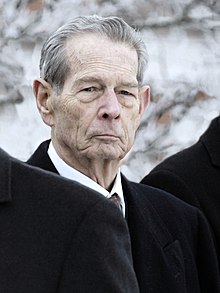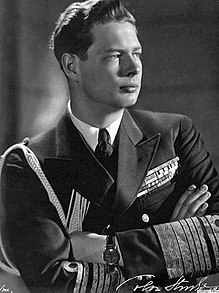Michael I of Romania
last king of Romania (r. 1927–1930, 1940–1947)
King Michael I (25 October 1921 – 5 December 2017) was the last king of Romania, reigning from 20 July 1927 to 8 June 1930 and again from 6 September 1940 until 30 December 1947. During World War II, he participated in a coup d'état against the pro-Axis dictatorship of Ion Antonescu. However, he was later forced to abdicate by Petru Groza's Communist government after the Soviet Union occupied the country. He eventually returned to Romania after the overthrow of its Communist government in 1989, and despite his abdication he remained popular with the Romanian public until his death.


Quotes
edit- Really?
- 5 Year old Michael, upon learning he had ascended to the throne, 20 July 1927. [1]
- The Crown is not a symbol of the past, but a unique representation of our Independence, Sovereignty and Unity. The Crown is a reflection of the state and the nation. The Crown has strengthened Romania through Loyalty, Courage, Respect, Seriousness and Modesty.
I do not see Romania today as an inheritance from our parents, but as a country that we borrowed from our children.
So Help us God!
Michael I R’ [citation needed]
- Because tens of millions of people have been destroyed practically, gone through absolute hell, and then suddenly they say, 'Well, it's all finished, let's forget it.' You don't forget it.
- About not forgetting the suffering communism had imposed on the Romanian people, in a 2009 interview with Radio Free Europe/Radio Liberty, [2]
- The last 20 years have brought democracy, freedom and a beginning of prosperity."...
"The time has come after 20 years to... break for good with the bad habits of the past", such as "demagogy, selfishness and attempts to cling to power"...
"It is within our power to make this country prosperous and worthy of admiration.- Speech to the Parliament at the Palace of the Parliament, Bucharest, on the occasion of his 90th Birthday (25 October 2011) [citation needed]
Quotes about King Michael I
edit- What - and leave the country in the hands of a child?
- Ion Antonescu's response to being requested to resign by The King. [3]
- Concern about outside pressure was greatly accentuated by the war. For the Soviets, Eastern Europe served not only as an economic resource and an ideological bridgehead, but also as a strategic glacis. The Soviet determination to dominate Eastern Europe was a key cause of tension, both local and international, not least because domination meant the imposition, through force and manipulation, of Communist governments. The Soviets were not satisfied by the nuances of influence. The 1946 Polish elections in which the Communists did well were fraudulent. Force played an important role in the extension of Communist control. For example, King Michael of Romania abdicated on 30 December 1947 after the royal palace in the capital, Bucharest, was surrounded by troops of the Romanian division raised in the Soviet Union.
- Jeremy Black, The Cold War: A Military History (2015)
- Michael is the only person who may be able to pull the country through the coming months and save it from anarchy or communism.
- A British foreign official wrote, in regards the Soviet occupation of the Kingdom of Romania.[4]
- I would like to pay tribute to his role when, in 1997, he undertook a tour of European capitals to promote Romania's entry into the European Union. Twenty-two years later, his beloved country will, for the first time in the first half of 2019, hold the presidency of the European Union. This will be an important moment for Romania and an important moment for the future of our Union.
The memory of King Michael, who went through the most tragic periods of European history of the 20th century, will then be more than ever present in our thoughts...- Statement by Jean-Claude Juncker upon learning of the death of The King. [citation needed]
- It is amazing that His Majesty King Michael I waited seventy years for the crown to be placed on him. It was very touching to hear the huge crowd chanting loudly ‘monarchy, kingdom…’. His Majesty was a great man who was deeply respected by everyone.
- Crown Prince Alexander of Serbia, Following the Funeral of The King, 16 December 2017
- King Michael I was simply exceptional…his strength, his dignity, his moral fibre..his devotion to his people left a huge mark and inspiration on many generations of Romanians.
- part of a speech delivered by Laura Daniela Popescu, Ambassador of Romania to the United Kingdom, 25 November 2021 [5]
- As Churchill and Roosevelt were overselling Yalta to the West, the agreements made there broke down in Eastern Europe during the month after the conference. The Soviets dragged their feet on repatriating prisoners of war. They did not send representatives to London to start up the new Control Commission for Germany. In Romania they forced the king to appoint a new government dominated by communists. In Poland they allowed the communist provisional government to veto candidates for its own “reconstruction” and to exclude Western observers, while potential rivals in Poland were butchered or sent to the camps. Stalin also said that Molotov was too busy to come to San Francisco and that the Soviet delegation to the UN founding conference would be led by Andrei Gromyko, then a midlevel diplomat. This was taken not only as a blatant snub but also as a real threat to the whole structure of postwar cooperation.
- David Reynolds, Summits: Six Meetings That Changed the World (2007)
- Romania posed a particular challenge for Soviet policies. It, too, had been a German ally, imitating the Nazis by murdering hundreds of thousands of Jews and Roma. It switched sides only in August 1944, when the war was going very badly for Hitler. The Communist Party there was weak and faction-ridden and did not have a key leader such as Dimitrov in Bulgaria. Worse, in Stalin’s view the Romanian party was dominated by “non-Romanians”—basically, Jews and Hungarians—who would not be recognized as “national” leaders. By the end of the war the Red Army had full military control, with a million Soviet soldiers stationed in Romania. But where to turn for effective local leadership? The Soviets decided to install a coalition government, as in Bulgaria, with the Communist Party in control of the ministry of justice and therefore the police. The young Romanian king, Michael, protested. Michael was regarded as a national hero after dismissing the pro-German leadership, but the Soviet emissary Andrei Vyshinskii gave him no choice. “You have two hours and five minutes to make it known to the public that [the government] has been dismissed,” the Soviet deputy foreign minister barked at the king. “By eight o’clock you must inform the public of [the] successor.” In November 1945 the Communist-led coalition won an election through widespread intimidation and fraud. Two years later it forced the king to abdicate. The government announced that a new People’s Republic of Romania was up and running.
- Odd Arne Westad, The Cold War: A World History (2017)
External links
edit- Encyclopedic article on Michael I of Romania on Wikipedia
- Media related to Michael I of Romania on Wikimedia Commons